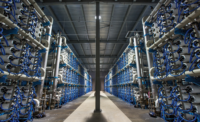After years of legal challenges and pipe dreams, a major $984-million water desalination plant has been green-lighted for construction near San Diego.

“This project has been a longtime coming,” says Peter MacLaggan, senior VP of development for Poseidon Resources of Carlsbad, Calif., the developer. “It’s something that the vast majority of the residents in the area have tremendous support for.”
The plant, which will be the nation’s largest seawater desalination plant, was approved November 29 by the San Diego County Water Authority’s (SDCWA) Board of Directors. The Board approved a 30-year Water Purchase Agreement to purchase up to 56,000 acre-ft of water annually from the facility.
With the agreement approved, Poseidon and the Water Authority will approach the bond market to secure financing by the end of this year.
Project officials say the reverse-osmosis facility will make local water supplies more reliable by reducing the region’s dependence on water from the Colorado River and the Bay-Delta that is vulnerable to droughts, natural disasters and regulatory restrictions. The desalinization process takes two gallons of seawater to make one gallon of drinking water. The plant is expected to start producing up to 50 million gallons a day in 2016.
“When its fully operational, the facility will represent 7% of our local water supply, which is significant because it’s truly local and not subject to the whims of Sacramento or Washington DC,” says Sandy Kerl, SDCWA deputy general manager. “Also, if there is a major earthquake and pipelines are broken, we wouldn’t have to worry about water getting to San Diego County.”
MacLaggan says there is a big need for the project because it’s a taken the San Diego region about 60 years to go from being entirely water-self-sufficient to getting almost 100% of its water from somewhere else.
“And now that water that comes from somewhere else is subject to intense competition and stringent environmental regulations that question the reliability of that supply to meet our needs going forward,” he says.
Plans for the desalinization plant have been in the works for years but have been slowed by a myriad of regulations and no less than 14 lawsuits from environmental groups. In fact, the same day that SDCWA approved the project, an appeals court shot down the latest challenge by Surfrider Foundation.
MacLaggan says he doesn’t know if there will be any more lawsuits, but as far as he is concerned there are no more “impediments” to construction. “The opposition is inconsequential in their ability to slow the project down at this point in time,” he says.



Post a comment to this article
Report Abusive Comment